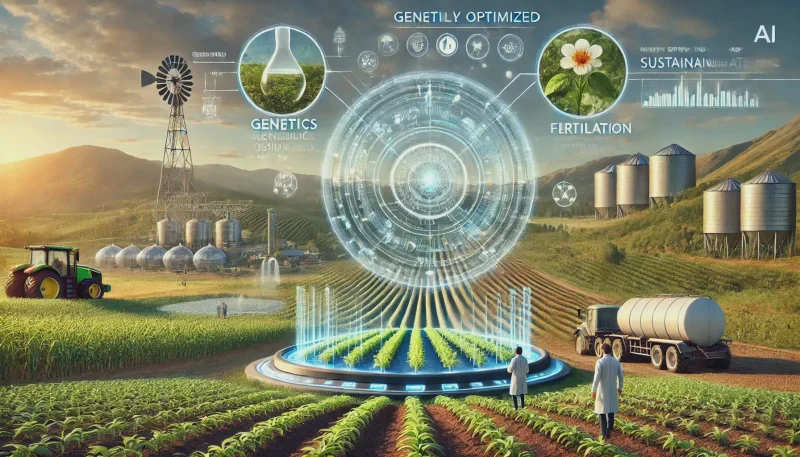Genetics, irrigation and fertilization: What needs to evolve to increase global food production without destroying our planet
Genetics, irrigation and fertilization: What needs to evolve to increase global food production without destroying our planet


Almost one out of ten people still do not get enough to eat. But hunger today is generally due to low incomes and poor food distribution, rather than failing to grow enough food. Farmers produce enough for everyone, but not all get what they need. Still, our daily lives are nothing like those of previous generations.
What happened? Modern agriculture.
…
In the 1960s and 1970s, in what is called the “Green Revolution,” research scientists, government agencies, agricultural businesses, and farmers themselves put together a new, strikingly more productive version of agriculture — Farming 2.0, if you will.
Today, Farming-2.0-style agriculture — which began with innovations in field crops like wheat but spread to other parts of farming, such as cattle ranching and chicken-raising — is by almost any measure the world’s most critical industry. It is directly responsible for our daily bread. But despite its overwhelming importance, Farming 2.0 is in many ways unknown to most of us, because it has been so smoothly successful that we have almost no picture of the underpinnings of the vast system that provides us with breakfast, lunch, and dinner. Too few have any sense of its scope, what brought it into existence, and in what ways it will need to change.
…
Today more than 1 percent of the world’s industrial energy is devoted to making ammonia fertilizer. “That 1 percent,” the futurist Ramez Naam says, “roughly doubles the amount of food the world can grow.”
…
Farming 2.0 has transformed human life, but it has also wreaked environmental havoc. Agriculture has always caused erosion, water pollution, biodiversity loss, and other ecological problems. Green Revolution farming, which places more demands on the Earth, has worsened these issues, with irrigation mismanagement and fertilizer overuse being particularly alarming. Poor irrigation practice can poison the soil by filling it with the salts dissolved in water; fertilizer overuse can pollute rivers, lakes, and oceans with the runoff from fields. All these problems must be resolved.
This is an excerpt. Read the original post here

 | Videos | More... |

Video: Nuclear energy will destroy us? Global warming is an existential threat? Chemicals are massacring bees? Donate to the Green Industrial Complex!
 | Bees & Pollinators | More... |

GLP podcast: Science journalism is a mess. Here’s how to fix it

Mosquito massacre: Can we safely tackle malaria with a CRISPR gene drive?

Are we facing an ‘Insect Apocalypse’ caused by ‘intensive, industrial’ farming and agricultural chemicals? The media say yes; Science says ‘no’
 | Infographics | More... |

Infographic: Global regulatory and health research agencies on whether glyphosate causes cancer
 | GMO FAQs | More... |

Why is there controversy over GMO foods but not GMO drugs?

How are GMOs labeled around the world?

How does genetic engineering differ from conventional breeding?
 | GLP Profiles | More... |

Alex Jones: Right-wing conspiracy theorist stokes fear of GMOs, pesticides to sell ‘health supplements’




 From plastic coasters to human hearts: Inside the race to print the human body
From plastic coasters to human hearts: Inside the race to print the human body A single high dose of LSD can ease anxiety and depression for months
A single high dose of LSD can ease anxiety and depression for months CRISPR pork: U.S. approves first gene-edited pigs for consumption
CRISPR pork: U.S. approves first gene-edited pigs for consumption ‘SuperAgers’: Why some people have the brains and memory capacity of people decades younger
‘SuperAgers’: Why some people have the brains and memory capacity of people decades younger  Baby food panic, brought to you by trial lawyers hoping to prosecute by press release
Baby food panic, brought to you by trial lawyers hoping to prosecute by press release From ‘Frankenfood’ to superfood: Can the purple tomato overcome GMO myths to win over consumers?
From ‘Frankenfood’ to superfood: Can the purple tomato overcome GMO myths to win over consumers? Viewpoint: Life and death decisions: RFK, Jr.’s shady FDA “expert panels” operate in secret with no transcripts or conflict of interest reviews
Viewpoint: Life and death decisions: RFK, Jr.’s shady FDA “expert panels” operate in secret with no transcripts or conflict of interest reviews When farmers deny science: The hypocrisy hurting agriculture’s credibility
When farmers deny science: The hypocrisy hurting agriculture’s credibility
